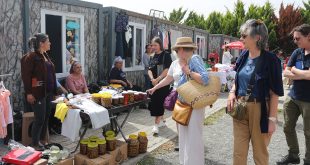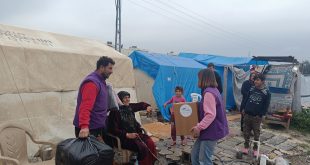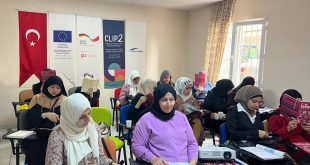Many children in the world cannot access the right to education due to economic difficulties, disasters and emergencies, and cultural reasons. Syrian children and girls are most affected by these conditions.
In April, when the theme of children’s rights came to the fore, we held an informative meeting with Syrian adult women on children’s right to education. We invited Ravda Nur Cuma, a refugee rights advocate and RavdaNur Der General Assembly Chairman, to talk about this subject. In the study, we talked about children’s right to education, the importance of girls’ access to education, the difficulties children experience in accessing education during the pandemic, how access to education is affected by emergencies and what measures should be taken against them.
Ravda Nur Cuma emphasized the importance of girls’ access to education with examples from her own life. She talked about how she learned Turkish in a short time to continue her education after she had to immigrate to Turkey with her family in 2011 and how she struggled with the obstacles in front of her. “The most important thing for a girl is that her family stands behind her,” she said, showing how much difference it made when her family supported her decision not to marry and continue her education. She said that all parents should protect their children against child marriage.
On the way to founding RavdaNur Association, Ravda Nur Cuma first fought for her girlfriends who were out of school when they reached high school. After visiting her friends’ houses one by one and trying to persuade their families to continue school, she continued her education and founded the association in order to do this on behalf of more children.
Ravda Nur Cuma mentioned that when she asked children about their dreams, some of them answered “get education” and stated that their innate rights turned into a dream due to the difficulties they faced in their short lives. She stated that the COVID-19 pandemic was a process in which they became victims again after the immigration processes they experienced. She emphasized that when she toured the tent cities, she saw that many people could not reach the necessary materials and care, but that these conditions should not prevent children from continuing their education, the importance of searching for existing opportunities and that education is the greatest hope by saying, “No wife can protect a girl more than education”. As she finished her speech, she remembered the words of her father the day she took her family out of the tent city: “I let one of my daughters study, she saved the whole family and she is making her sisters study. Imagine if all girls read, they would save the world.”
At the end of the speech, the participants took the floor and gave examples both from their surroundings and from their own lives. They stated that they were very pleased to listen to the inspiring story of Ravda Nur Cuma and said that they support education instead of child marriage, and that they fight for their own children.
Supporting children, especially girls, in their access to education is an important part of our work. We started these efforts in our first years at Fener/Balat by supporting children’s school lessons and homework. Since 2010, we have been involved in many projects and adaptations related to access to education. We adapted the Girls Empowerment Workshop Series, which we created with Turkish girls in 2015, for Syrian girls. We have been carrying out projects in the field of Child Protection since 2017. We provided consultation services and distributions to support online education during the COVID-19 pandemic. We continue to keep track of the challenges encountered in the field of education and shape our work with this priority.
 Mavi Kalem Sosyal Yardımlaşma ve Dayanışma Derneği Hayata Rengini Kat!
Mavi Kalem Sosyal Yardımlaşma ve Dayanışma Derneği Hayata Rengini Kat!





